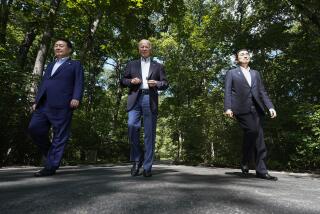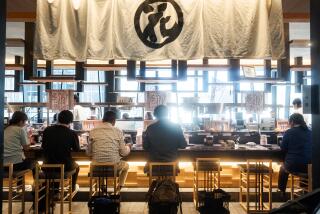Insider : In U.S., Uneasiness About Gorbachev’s Journey to Japan : Policy-makers aren’t worried about an immediate breakthrough with Prime Minister Toshiki Kaifu. They are concerned about the long-term results.
- Share via
WASHINGTON — If it had happened a year ago, it would have made the Bush Administration extremely nervous.
But now, as Soviet President Mikhail S. Gorbachev prepares for next week’s visit to Japan, U.S. officials view the short-term impact of his trip in a more relaxed fashion.
“We’re not worrying anymore, because the glow is off Gorbachev, who goes to Japan as the beleaguered leader of a failing nation and a failing economy,” says a State Department official.
A senior Bush Administration official agrees. “I think this is going to be an underwhelming visit,” he says. “Right now, the Soviet military continues to constrain what Gorbachev can do.”
Can it really be that simple? Is the Bush Administration so bursting with self-confidence after the Persian Gulf War that it can accept with equanimity the first trip ever made by a Soviet leader to Japan, one of America’s closest allies?
Maybe not.
The Soviet Union and Japan are, after all, the United States’ biggest potential military rival and its principal economic competitor, respectively. Looked at another way, they are also the world’s largest nation and the most prosperous country in Asia, where American economic stakes are huge and growing.
And indeed, Administration officials, policy-makers and analysts admit to a sense of uneasiness about what the Gorbachev visit could mean for the United States in the long term. They worry not so much about an immediate, dramatic breakthrough in Tokyo but rather about the gradual impact over the next several years.
Two U.S. government analysts predicted that over the next year or two, the Gorbachev trip will come to be seen as a “watershed event” starting the process of rapprochement between East Asia’s two old rivals--an event with unpredictable consequences for that region and for the American role there.
“The Gorbachev visit is no big deal in and of itself,” says Paul Kreisberg, an expert on Asia at the Carnegie Endowment for International Peace. “But it’s part of a larger process of change. And if successful, it would be seen as the crossing of the Rubicon, in terms of the Soviets no longer being seen as a threat in Japan.
“An extended period of relaxed tensions between the Soviets and Japan would raise questions in Japan over the next five to seven years about security relations between the United States and Japan,” Kreisberg adds. “People in Japan could ask, ‘Why do we need to have 50,000 Americans sitting on our turf now?’ ”
Gorbachev will visit Japan April 16-19. According to Japanese media reports, the Soviet leader will meet three times in Tokyo with Prime Minister Toshiki Kaifu. He also will have an audience with Emperor Akihito.
He is expected to talk with Japanese students, to address both houses of the Diet, Japan’s legislature, and to make stops in Kyoto and Osaka. The Soviet leader also reportedly will pay a symbolic visit to Nagasaki, which was destroyed by the second American atomic bomb attack in August, 1945.
During his trip, Gorbachev is expected to begin talks aimed at overcoming the single biggest obstacle to improved relations between Moscow and Tokyo: the return of some or all of the four northern islands seized by the Soviet Union at the end of World War II.
A senior Japanese Foreign Ministry official said last week that Japan will accept nothing less than Soviet recognition of Tokyo’s “sovereignty” over all four islands.
And U.S. analysts say they believe that Japan may eventually get what it wants. “We see signs that Gorbachev is prepared to return all four islands if the price is right,” one American analyst says.
He speculates that the Soviet Union might return these islands in stages: two islands relatively quickly, in exchange for a peace treaty formally ending the World War II hostilities between the two countries, and the other two islands later, when the Japanese finish paying the price.
What will the Soviet price tag be for return of the islands?
Over the past few weeks, Japanese media reports have said Kaifu’s government is prepared to pay as much as $28 billion for Soviet recognition of Japan’s claims to the islands. A Japanese Foreign Ministry official in Tokyo denied this report.
U.S. officials don’t believe the reports of a $28-billion deal. “The Japanese will throw some small change their (the Soviets’) way at the beginning of the talks,” a U.S. analyst says.
One U.S. government analyst said that over the long run, the price Japan will have to pay the Soviets for return of the islands lies somewhere between the $3 billion that South Korea paid for diplomatic recognition by Moscow and the $20 billion that Germany is paying for the former East Germany.
“Maybe it will be $10 billion to $15 billion,” the official estimates.
However, U.S. officials believe that to reach any agreement with Japan, Gorbachev will have to overcome strong opposition at home to a giveaway of Soviet territory.
“It would have been a lot easier for Gorbachev to cut a deal with Japan two years ago, when he was riding a crest (of high prestige) abroad and before the Russian republics and Yeltsin were challenging him at home,” a U.S. analyst said.
Boris N. Yeltsin, the president of the Russian Republic and Gorbachev’s top political rival, has argued that the Soviet Union would have to obtain Russia’s consent to any deal involving the four islands, which are now part of Russian territory.
So touchy are political sensitivities in Moscow over the islands that when entrepreneur Artem Tarasov accused Gorbachev of planning to trade some of the islands to Japan for $200 billion in Japanese investment, the Soviet leader filed a well-publicized libel suit against Tarasov.
U.S. officials also believe the current Soviet economic woes undermine the Tokyo summit in another way--by reducing, if not eliminating, the desire of Japanese companies to invest money in the Soviet Union.
“The Japanese are very good businessmen, but they are risk-averse,” says one State Department official. “They know the Soviet Union is in deep trouble, politically and economically. It’s not a good investment at the present time.”
The principal American interest in the Tokyo summit is essentially a conservative one: to preserve the security arrangements--and, implicitly, the American economic positions--that have existed in East Asia and the Pacific since 1945.
Most of all, Administration officials want to avoid anything that would call into question the Japan-U.S. Security Treaty of 1960, which permits the stationing of U.S. forces in Japan. Those forces are the linchpin in the Pentagon’s policy of forward deployment of troops in Asia.
“The Japanese are very aware that we don’t want anything to interfere with our freedom of the seas, or with our security commitments, including our commitments to Japan,” a State Department official says.
American worries a year ago were that a Gorbachev visit to Japan could, by itself, lead to dramatic changes in Asian security.
“We were concerned that he would land in Tokyo, that there would be an outpouring of ‘Gorbymania,’ that he would make an offer on the northern territories and that all of that would produce a real political challenge to our relationship with Japan,” a U.S. official says. “Now, the atmospherics have changed. I don’t expect any great breakthroughs on this trip.”
Even so, Gorbachev’s visit could mark the beginning of what one U.S. analyst called a sea change in the many intermingled relationships among the nations of East Asia and the Pacific--some of which have already been considering what changes the end of the Cold War might mean for Asia.
To the irritation of the Bush Administration, over the past year even Canada and Australia, both close U.S. allies, have begun to propose the creation of some new security grouping in Asia similar to the Conference on Security and Cooperation in Europe. Such a change would inevitably dilute U.S. power in the Pacific, which long has been known as “the American lake.”
In a recent interview with Japan’s Kyodo News Service, Gorbachev raised once again the longstanding Soviet desire to move “toward a new security structure” in Asia--carefully emphasizing that the Soviet Union and the United States would be “indispensable participants” in any new security arrangement.
“This will be part of Gorbachev’s pitch in Japan,” a U.S. official says. “We (the United States) clearly are not anxious to see the Soviets make headway on the idea of new security ties in Asia. That doesn’t serve our interests.”
Any rapprochement between Moscow and Tokyo might also worry China--a development that some U.S. officials say might be beneficial in spurring political and economic changes in China.
“China, I would hope, would feel a little threatened,” a State Department official says. “They could view this as one more indication that Japan, and not China, has emerged as the dominant power in Asia and the role model for other Asian countries.”
Gorbachev has a long track record of unveiling bold and unexpected proposals on his foreign trips. One senior U.S. official last week wondered aloud whether, after landing in Tokyo, the Soviet leader might suddenly propose to take the lead in helping Japan somehow gain the permanent membership it wants on the U.N. Security Council.
“You still can’t preclude some element of surprise,” says Jonathan Pollack, an Asia security expert at the RAND Corp. “But personally, my expectations are not very high. Gorbachev is constrained by domestic problems.
“And I just don’t think the Japanese would be inclined to blindside us in any of these areas. The relationship with the United States is just so important to them.”
More to Read
Sign up for Essential California
The most important California stories and recommendations in your inbox every morning.
You may occasionally receive promotional content from the Los Angeles Times.













